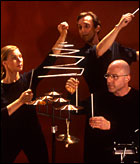Joe Chvala and the Flying Foot Forum: Flying Feats Among the Folk
The Flying Foot Forum (at the Southern Theater, Nov. 10) carries some uncharacteristic lead in their pants. How come?

Lights go up on two women at the center of the stage. They’re plain and square in homely dresses and they dance squarely too, feet rigidly front-pointed as if their legs were wood pins turned in wood hips, arms in flat circles, a clog-tap that’s like climbing a church staircase. When they sway, they do it roundly and wholly, no limb loose, no abandon. And their emotions stay gentle: curiosity, guardianship, content. A few gestures—taking hands, holding back, opening out, leading and following—suffice for this quiet life.
This isn’t what you would expect from a company with the exuberant name Flying Foot Forum. It’s also not what you expect from tap dance, which is often exuberant or angry, flapping arms and flashy feet, every moment just barely saved from arrhythmic disaster. Instead, in “All of One Size,” the FFF give us a comfort zone. No one tries anything risky; all the risk rides in the repeated refrain, where a backwoods voice reminds us “Six feet of earth will make us all of one size.” Our talent and the things we alone can do will mean nothing, and all that will be left is common humanity.
In the hands of choreographer Karla Grotting, this piece is honest, meaningful, and moving (though not exciting) and that’s largely due to her own strangely honest presence. She leaves perfect circles behind her in the air, large clear patterns with the mesmerizing mathematical rightness of a Spirograph. She knows where every part of her body is and so do you; she has no tricks, no cheats. Her timing is big, her music just one inch fatter than the actual music, so that her movements aren’t late but blue, felt. She looms oddly close, in your or her own home, and not actually dancing—something about her large, regular features, or the thoughtful distance between her eyes—not performing, but sweeping the floor or gardening or making breakfast. She’s at once domestic and spiritual, and so is her work.
So you’re thinking the FFF will just do this country folks routine for one piece—but, aside from an exuberant vocal improv by Peter O’Gorman; “Trines,” a piece which has pleasing moments but never quite reaches, in the dance, the strange and slightly sinister mood established by O’Gorman’s drumming, a Miss Saigon-like set, and the strangest sound of the year, something between a tazz and a ting, created by spinning percussive spirals; and one other piece I’ll mention later, the country mood carries the day. “Knock Me a Kiss,” with Megan McClellan and Brian Sostek, is light and cute, not sexy or show-stopping; and “Filarfolket,” which fills the second half of the program, brings back the country costumes (simple dresses, white socks, pants with suspenders, black vests), the mild manners, and the barn-dance setting.
What’s going on here? Call it the Amish vibe or family values programming; I couldn’t decide whether I was seeing a po’ folks act put on by super-subtle city-dwellers, or the real thing—and I couldn’t decide which made me more uneasy. Consider this moment from “Filarfolket”: the women kick up upside-down straight-legged lifts that show off frilly drawers. It’s meant to be funny, but it feels cautionary; the drawers, and the awkward lifts, are the opposite of sexy, are even a prophylactic against sex.
Or consider this performance’s approach to virtuosity—the “don’t try this at home” effect, that live connection between edge-of-seat audience and seat-of-pants performer, the pyrotechnics most people expect from tap. The FFF pass this up in favor of the “we tried this at our home” effect, with the virtuosity second-hand, not “live,” but canned, with us, the modern viewers, looking through windows at a barn-dance or watching old nightclub reels.
This is intentional; the FFF want us to see tap as part of a narrative, not just as a show someone puts on. They’re deliberately avoiding the stick-on fig leaf effect, or I’ve forgotten, why is Fred Astaire dancing again? Virtuosity is a threat to continuity, in any form: thirty-two fouettes don’t advance the story; pyrotechnics blind understanding. Unless fire is what you’re trying to understand—and tap, like Bach, like jazz, like rap, has a history of exploring just that, of testing the most difficult ways to get from here to there. This journey can be just as exciting as a story: witness Peter O’Gorman’s virtuoso vocal improv, tap for your mouth, and you’ll be caught up, excited, wondering along with him where he’s going to go and laughing at each unexpected move. But this isn’t what the FFF want to do in this show. Moments of virtuosity (a body-slapping routine from Sostek and Joe Spencer, a tiny dance-off) disappear into the general harmony, into the plan.
Back to that other exception I said I would mention: in “Side-Show Joe,” Joe Chvala is a drunk hoofer in a loud plaid coat, an old vaudevillian who doesn’t know when to quit. He pulls out all the old moves and a few more; he’s obnoxious, a bit raunchy, and in Chvala’s loose moves and wacky acting, really funny. But if I were a psychoanalytic critic—and I’m not, but why not go slumming?—I’d see “Side-Show Joe” as a way for Chvala to simultaneously let loose the inner hoofer and punish him. “Flying Feats” in general is characterized by a refusal to grab attention; in “Side-Show Joe” Chvala grabs attention (and several parts of himself), but in a look-how-bad-this-is context.
It’s not that I didn’t enjoy myself. The dancers are good and at times I was caught up in the motion. But I can’t help wondering what’s going on here. Why are the Flying Foot Forum so tame?